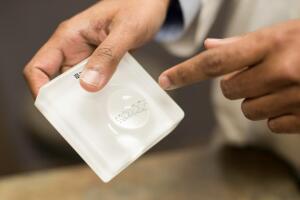by
Lauren Dubinsky, Senior Reporter | April 10, 2017

A conventional metal stent
Cardiologists should continue to use conventional drug-eluting stents instead of the newer bioresorbable stents, according to an editorial published in the New England Journal of Medicine. Dr. Debabrata Mukherjee of the Texas Tech University Health Sciences Center El Paso believes that the benefits are not worth the risk.
Abbott’s Absorb became the first bioresorbable stent when it was approved by the FDA in July 2016. It’s designed to naturally dissolve in the body three years after its implanted, which avoids the risk of blood clots, scar tissue or blockage reoccurrence.
But things changed in March when a study published in
NEJM showed that Absorb is associated with an elevated risk of device thrombosis. Out of 1,845 patients undergoing percutaneous coronary intervention, the researchers assigned 924 to receive a bioresorbable stent and 921 to receive a drug-eluting stent.
They found that thrombosis formed in 31 of the patients who received the Absorb stent, but only in eight of those with a drug-eluting stent, after a two-year follow-up. There was, however, no significant difference in the rate of target-vessel failure between the two groups.
In his editorial, Dr. Mukherjee explained that since the current generation of metallic drug-eluting stents are associated with excellent outcomes, there’s little rationale in using bioresorbable stents at this time.
"Bioresorbable stents cost more than the typical metallic stent and they take longer for cardiologists to insert," he wrote. "They are also no more effective, and less safe. As a physician, why am I going to use something that costs me more if it can cause risk or harm to my patients?"
There are currently 37 trials underway investigating Absorb further, five of which are enrolling more than 2,000 patients each. These trials will be completed in the next four to five years and will provide longer-term evidence.
Absorb has not been recalled, but ECRI Institute told HCB News that this new evidence may drive health care providers to rethink whether they want to use it. In the very least, they will discuss the potential advantages and disadvantages of the bioresorbable stent versus the drug-eluting stent with their patients.
Dr. Mukherjee noted that long-term, increased anti-clotting medicine may reduce thrombosis in patients who receive Absorb, but that the risk of bleeding isn’t worth it.
He hopes that the next generation of bioresorbable stents will have better results. He recommends that manufacturers aim to design stents with quicker reabsorption rates, thinner struts and improved strength.
Back to HCB News
